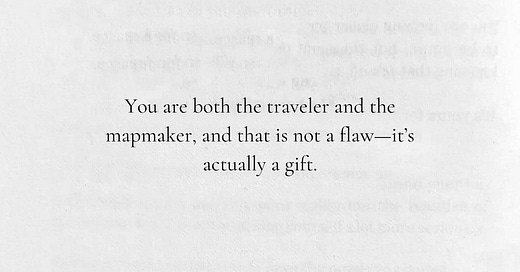There’s a moment in every journey when we find ourselves standing at a crossroads, desperately scanning the horizon for someone to tell us which path to take.
It feels instinctual—this reaching outward for clarity.
After all, we’ve been conditioned to believe that someone else always knows better: the teacher, the expert, the friend who seems to have it all together. But what happens when the map we’re looking for hasn’t been drawn yet? When the landscape we’re crossing is wild and uncharted?
Glennon Doyle’s quote, “Stop asking people for directions to places they’ve never been,” isn’t just a reminder—it’s a reclamation. It’s an invitation to trust that your internal compass is capable of guiding you somewhere no one else has ventured.
It’s about letting go of the illusion that others hold the answers and embracing the truth that your path will only ever be as unique as you are.
We ask for directions because we want to feel safe. It’s human nature to crave a sense of certainty in the face of the unknown. But when we rely on others to tell us where to go, what we’re really asking is, “Can you validate this for me? Can you confirm that this dream, this idea, this risk is worth it?”
The trouble is, people can’t give you directions to places they’ve never traveled.
They can only hand you their own map—one that’s marked with their fears, biases, and limitations. They might mean well, but their advice is often rooted in what’s familiar to them, not in what’s true for you. And if you’re not careful, you’ll find yourself living someone else’s life, trying to follow a map that doesn’t lead to your destination.
No one can chart your course for you because no one else has lived your exact life. No one else knows the intricate combination of your dreams, your strengths, your wounds, your inner-most desires and your innate purpose. You are both the traveler and the mapmaker, and that is not a flaw—it’s actually a gift.
But trusting your inner compass requires a kind of valor. It means stepping into uncertainty without a guarantee of where you’ll end up. It means having conviction for who it is that you are. It means being willing to fail, to pivot, to try again. It means silencing the noise of the world long enough to hear the dialect of your own intuition.
That voice may be quiet, but it’s always there. It speaks through the small tug of excitement when you imagine doing something different, bold.
It shows up in the resistance you feel when you consider taking someone else’s advice that doesn’t sit right in your gut.
Trusting yourself doesn’t mean you’ll always get it right—it means you’re willing to get it wrong and learn from it.
And when you stop asking people for directions to places they’ve never been, you also release them from the burden of being responsible for your journey. This doesn’t mean you can’t seek support or community—those things are vital—but there’s a difference between sharing your journey with others and expecting them to navigate it for you.
It’s liberating to let people be human, to understand that their advice is shaped by their own experience, not by some universal truth. And it’s equally liberating to stop waiting for permission to pursue what’s calling you.
There’s a reason you feel drawn to certain places, certain ideas, certain ways of being. That pull isn’t random—it’s part of who you are. And maybe the reason no one else has the map you’re seeking is because you are the one who’s meant to forge the trail.
Your journey will not look like anyone else’s, and that’s entirely the point. It will be messy and nonlinear, full of detours and surprises. But it will also be alive, vibrant, and undeniably yours.
So the next time you find yourself searching for validation or asking for directions, pause and ask yourself this very simple question: Is this something that they can truly answer? Or is this something that I need to answer for myself?
The truth is, no one has been where you’re going—not exactly. But that doesn’t mean the destination isn’t real or worth pursuing. It just means the path hasn’t been walked yet—by you.
And that’s where the magic lives: in the uncharted, the unexplored, the journey that’s solely yours to unravel.
x, Cassandra



